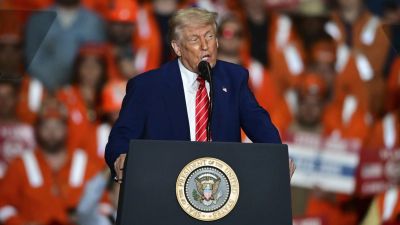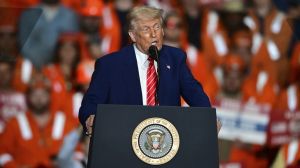Protesters push for polls as Thai tensions build
Cheering,blaring horns and waving flags,thousands of protesters started to move on Monday toward a military base in Bangkok where the premier has his crisis headquarters,putting pressure on him to call elections.
Cheering,blaring horns and waving flags,thousands of protesters started to move on Monday toward a military base in Bangkok where the premier has his crisis headquarters,putting pressure on him to call elections.
The red-shirted supporters of former prime minister Thaksin Shinawatra gave the government an ultimatum to dissolve parliament and call elections by midday on Monday or face mass street demonstrations.
Backed by the powerful military and establishment elite,Prime Minister Abhisit Vejjajiva flatly refused,reinforcing speculation he will prevail in the showdown.
“Everyone agrees that we cannot do it,” Abhisit said in a live national broadcast Monday morning.
“It’s not that we will not listen to the people,including the protesters. We want to see the country moving forward within the rule of law not just for today but also for the future.”
The protests,which began on Friday,reached more than 150,000 people on Sunday but have been peaceful and orderly. But Monday’s march could stoke anger by worsening traffic congestion in Bangkok,whose residents are mostly allied with Abhisit.
Despite the increase in political tension,foreign funds have been flowing into Thailand’s stock market – to the tune of $812 million over the past three weeks — as investors seek to benefit from a swift rebound in Southeast Asia’s emerging economies.
As a sign of this,Thai stocks were slightly firmer on Monday after racing ahead 63 percent last year.
Recent foreign buying was based on three factors: Thai assets are already trading at a substantial risk discount,the economy has rebounded well from the global downturn despite bouts of unrest; and,Abhisit is widely expected to survive the protests.
The protesters caused immediate congestion as they started moving from their rally site in the centre before 9 a.m. (0200 GMT),mostly on motorbikes and pickup trucks. Tens of thousands had regrouped at the military base.
Protest leaders hope a powerful display of non-violent support will pressure Abhisit into call an election that Thaksin’s allies would be well placed to win. They also want to convince wavering partners in his coalition to break away.
Weng Tojirakarn,a protest leader,said they will rally peacefully outside the base.
“We will not besiege anything,” he said aboard a truck-turned-makeshift stage as the crowd moved toward the infantry. “We want to bring the people to Abhisit to show him how much support we have and how little he has.”
About 3,000 soldiers were deployed at the base and helicopters were ready for evacuation,said army spokesman Sansern Kaewkamnerd. Soldiers lined up behind barricaded and barb-wired fences and gates.
The protest deepens a seemingly intractable political crisis pitting the military,urban elite and royalists — who wear yellow at protests and back Abhisit — against mainly rural Thaksin supporters who wear red and say they are disenfranchised.
Most of the protesters travelled from Thailand’s poor,rural provinces,piling into pick-up trucks,cars and even river boats,illustrating Thaksin’s influence despite his removal in a 2006 coup,a graft conviction and self-imposed exile.
Although foreign investors expect Abhisit to prevail in the “red shirt” showdown,some risks loom ahead.
Thaksin’s allies are likely to win the next election which must be called by the end of next year,just as they have won every poll held since 2001. The military and urban elite could seek to overturn that result,possibly with a coup,as in 2006,or a judicial intervention,as in 2008,triggering unrest.
The “red shirt” protesters say the British-born,Oxford-educated Abhisit came to power illegitimately,heading a coalition the military cobbled together after courts dissolved a pro-Thaksin party that led the previous coalition government.
Adding to their anger,Thailand’s top court seized $1.4 billion of Thaksin’s assets last month,saying it was accrued through abuse of power.
Abhisit insists his government came to power legitimately. While his party came in second in the last election in 2007,he won the support of the majority in parliament.
Thailand was plagued by political upheaval in 2008,when yellow-shirted protesters who opposed Thaksin’s allies in the previous government occupied the prime minister’s office for three months and then blockaded Bangkok’s international airport until a court ousted the government.
Last April,protests by Thaksin supporters triggered Thailand’s worst street violence in 17 years. In recent months,they have emphasized non-violence – and Thaksin’s rhetoric is less incendiary than last year when he spoke of a “revolution.”





- 01
- 02
- 03
- 04
- 05


























